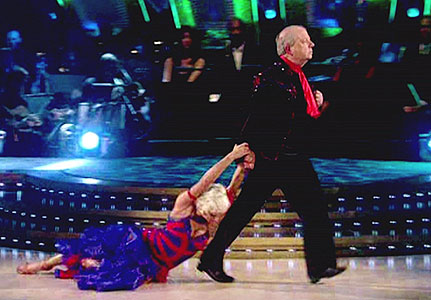The Real World

December 2009 The Psychologist, 22 (12), 996.
Psychologist readers who are fans of Strictly Come Dancing are hopefully finding some relief from the pressures of work in their weekly fix of dizzying drama and dazzling outfits. It would be nice if this provided a complete break from our professional activities, but alas (if our experience is anything to go by) this is never entirely possible. Not least, this is because every week we are confronted with the challenging task of trying to understand exactly (a) how the public voted and (b) why it voted the way it did. Infuriatingly too, the data on which to base this analysis are very limited: the judges’ scores are known (and usually quite predictable), but one can typically only infer who the public have not voted for by their presence in the dreaded dance-off.
Nevertheless, the data this provides is itself quite informative, and we think that at least three bodies of psychological literature can help to make sense of it. The first is work by the Australian psychologist Norm Feather into “the tall poppy syndrome” and that of Cardiff Professor Russell Spears into the related phenomenon of Schadenfreude.
In this regard, what is striking about early rounds of SCD is that the dance-off commonly contains at least one female celebrity with phenomenal dancing ability. Indeed, in recent series there have been critical points (about half-way through the programme) in which — much to the distress of the judges — two of the best women (2007: Gabby Logan vs. Penny Lancaster; 2009: Zoe Lucker vs Ali Bastian) have had to endure the unexpected trauma of head-to-head sudden death. In line with Feather and Spears’s work, what is clear from this is that the public has little sympathy for those who make them feel inferior. There are also reasons for suspecting that this may be especially true when the individuals in question are women.
Second, though, it is interesting to note that the shock of a leading competitor bowing out in this way often appears to be a trigger for a major reorientation of voting practices. Specifically, in line with work by Columbia psychologist Tory Higgins on regulatory focus theory, it appears that prior to this point voters have typically had a “prevention focus” in which their voting is determined primarily by who they want to save; however, after this there is more evidence of voters adopting a “promotion focus” in which they start to vote for who they want to win. It seems plausible too that at this ‘tipping point’, the psychological profile of voters starts to change — so that people now vote with a view to ensuring that what they want to happen does, rather than so that what they don’t want to happen doesn’t.
Finally, third, throughout the series, there is evidence of the ‘John Sergeant effect’ whereby a bad competitor is kept in precisely in order to 'spite' the judges who oppose themselves in their expertise to 'ordinary people'. In many ways, this is a textbook illustration of the phenomenon of ‘reactance’ — a term coined by University of Kansas professor Jack Brehm to refer to the tendency for people to resist injunctions by others (especially those in authority) as a means of demonstrating their capacity for free will. Thus insistence by the judges that viewers should vote only for the best dancers, impels them to do the very opposite. As we argue in some of our own recent work on leadership, what this phenomenon also shows very clearly is that a person’s capacity to influence others depends not on how much they know but on how much others identify with them as ‘one of us’. Indeed, part of the show’s appeal is that this tension between the judge’s knowledge and their limited power is skilfully manipulated by the BBC as part of the ongoing pantomime.
However, as with all research that is based on imperfect data, we can make no claims about the validity of the above analysis. Another reason for this is that, psychologically speaking, there is an awful lot going on here. It may be stretching the point to suggest that SCD provides a dance-floor on which every chapter of the psychology textbook takes a spin, but certainly there’s much more here than just sequins and salsa.
The Real World
A Migrant is not a migrant by any other name
October 2015
It's a man's (virtual) world
June 2014
Putin: The Naked Truth
April 2014
Genius and creativity (re)explained
October 2013
In praise of asylums
September 2013